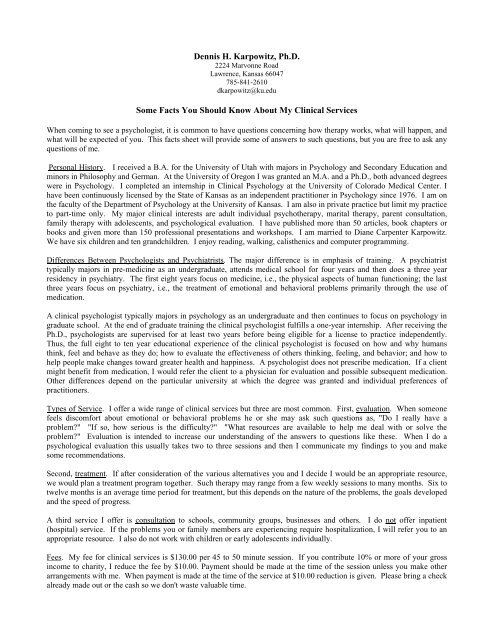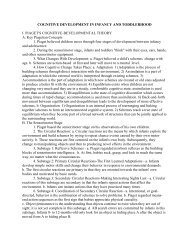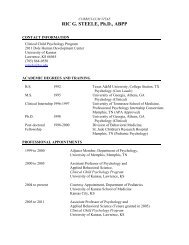About My Clinical Practice - Department of Psychology - The ...
About My Clinical Practice - Department of Psychology - The ...
About My Clinical Practice - Department of Psychology - The ...
You also want an ePaper? Increase the reach of your titles
YUMPU automatically turns print PDFs into web optimized ePapers that Google loves.
Dennis H. Karpowitz, Ph.D.<br />
2224 Marvonne Road<br />
Lawrence, Kansas 66047<br />
785-841-2610<br />
dkarpowitz@ku.edu<br />
Some Facts You Should Know <strong>About</strong> <strong>My</strong> <strong>Clinical</strong> Services<br />
When coming to see a psychologist, it is common to have questions concerning how therapy works, what will happen, and<br />
what will be expected <strong>of</strong> you. This facts sheet will provide some <strong>of</strong> answers to such questions, but you are free to ask any<br />
questions <strong>of</strong> me.<br />
Personal History. I received a B.A. for the University <strong>of</strong> Utah with majors in <strong>Psychology</strong> and Secondary Education and<br />
minors in Philosophy and German. At the University <strong>of</strong> Oregon I was granted an M.A. and a Ph.D., both advanced degrees<br />
were in <strong>Psychology</strong>. I completed an internship in <strong>Clinical</strong> <strong>Psychology</strong> at the University <strong>of</strong> Colorado Medical Center. I<br />
have been continuously licensed by the State <strong>of</strong> Kansas as an independent practitioner in <strong>Psychology</strong> since 1976. I am on<br />
the faculty <strong>of</strong> the <strong>Department</strong> <strong>of</strong> <strong>Psychology</strong> at the University <strong>of</strong> Kansas. I am also in private practice but limit my practice<br />
to part-time only. <strong>My</strong> major clinical interests are adult individual psychotherapy, marital therapy, parent consultation,<br />
family therapy with adolescents, and psychological evaluation. I have published more than 50 articles, book chapters or<br />
books and given more than 150 pr<strong>of</strong>essional presentations and workshops. I am married to Diane Carpenter Karpowitz.<br />
We have six children and ten grandchildren. I enjoy reading, walking, calisthenics and computer programming.<br />
Differences Between Psychologists and Psychiatrists. <strong>The</strong> major difference is in emphasis <strong>of</strong> training. A psychiatrist<br />
typically majors in pre-medicine as an undergraduate, attends medical school for four years and then does a three year<br />
residency in psychiatry. <strong>The</strong> first eight years focus on medicine, i.e., the physical aspects <strong>of</strong> human functioning; the last<br />
three years focus on psychiatry, i.e., the treatment <strong>of</strong> emotional and behavioral problems primarily through the use <strong>of</strong><br />
medication.<br />
A clinical psychologist typically majors in psychology as an undergraduate and then continues to focus on psychology in<br />
graduate school. At the end <strong>of</strong> graduate training the clinical psychologist fulfills a one-year internship. After receiving the<br />
Ph.D., psychologists are supervised for at least two years before being eligible for a license to practice independently.<br />
Thus, the full eight to ten year educational experience <strong>of</strong> the clinical psychologist is focused on how and why humans<br />
think, feel and behave as they do; how to evaluate the effectiveness <strong>of</strong> others thinking, feeling, and behavior; and how to<br />
help people make changes toward greater health and happiness. A psychologist does not prescribe medication. If a client<br />
might benefit from medication, I would refer the client to a physician for evaluation and possible subsequent medication.<br />
Other differences depend on the particular university at which the degree was granted and individual preferences <strong>of</strong><br />
practitioners.<br />
Types <strong>of</strong> Service. I <strong>of</strong>fer a wide range <strong>of</strong> clinical services but three are most common. First, evaluation. When someone<br />
feels discomfort about emotional or behavioral problems he or she may ask such questions as, "Do I really have a<br />
problem" "If so, how serious is the difficulty" "What resources are available to help me deal with or solve the<br />
problem" Evaluation is intended to increase our understanding <strong>of</strong> the answers to questions like these. When I do a<br />
psychological evaluation this usually takes two to three sessions and then I communicate my findings to you and make<br />
some recommendations.<br />
Second, treatment. If after consideration <strong>of</strong> the various alternatives you and I decide I would be an appropriate resource,<br />
we would plan a treatment program together. Such therapy may range from a few weekly sessions to many months. Six to<br />
twelve months is an average time period for treatment, but this depends on the nature <strong>of</strong> the problems, the goals developed<br />
and the speed <strong>of</strong> progress.<br />
A third service I <strong>of</strong>fer is consultation to schools, community groups, businesses and others. I do not <strong>of</strong>fer inpatient<br />
(hospital) service. If the problems you or family members are experiencing require hospitalization, I will refer you to an<br />
appropriate resource. I also do not work with children or early adolescents individually.<br />
Fees. <strong>My</strong> fee for clinical services is $130.00 per 45 to 50 minute session. If you contribute 10% or more <strong>of</strong> your gross<br />
income to charity, I reduce the fee by $10.00. Payment should be made at the time <strong>of</strong> the session unless you make other<br />
arrangements with me. When payment is made at the time <strong>of</strong> the service at $10.00 reduction is given. Please bring a check<br />
already made out or the cash so we don't waste valuable time.
Sessions which are longer or shorter in length than 45 to 50 minutes will be prorated on the basis <strong>of</strong> length in 15 minute<br />
increments. If you have health insurance which covers emotional/mental health, please let me know. Such coverage<br />
typically pays from fifty to eighty percent <strong>of</strong> the services you receive from me. Please feel free to discuss fees more<br />
specifically with me whenever you have a question or concern.<br />
Client and <strong>The</strong>rapist Responsibilities. Psychotherapy or counseling requires participation and cooperation from the client.<br />
Your own effort will play the most important role in determining how much benefit you receive from coming to therapy.<br />
Another important part <strong>of</strong> treatment is honest communication between the client and the therapist. This should include<br />
your raising any concerns you have about the procedural matters described here or introduced later.<br />
Much <strong>of</strong> what occurs during a psychotherapy session is talk. You will be expected to relate problems and concerns as well<br />
as successes and enjoyable experiences. Sometimes you may feel anxious or angry or some other emotion. Such feelings<br />
are perfectly "ok" to experience. <strong>The</strong>y are a normal part <strong>of</strong> the therapy process.<br />
In order for communication to occur effectively the client and the therapist should come to like each other, to be friendly.<br />
During the first few visits you should ask yourself if I am the kind <strong>of</strong> person you can talk with comfortably. I will also ask<br />
this question <strong>of</strong> myself about you. Please feel free to express concerns you have in this area at anytime.<br />
At appropriate times you will also be given homework assignments. <strong>The</strong>se assignments may include reading, keeping a<br />
journal, monitoring your own <strong>of</strong> someone else's behavior, practicing a new skill, filling out a questionnaire, etc. It is<br />
important that such homework be carried out conscientiously. You may also be asked to take some tests at various stages<br />
<strong>of</strong> the psychotherapy process. All homework assignments are intended to help you reach your goals more quickly and<br />
effectively. Some clients experience depression as part <strong>of</strong> their problems. At times individuals can become so depressed<br />
and discouraged that they seriously think about taking their own life. Such feelings, should you have them, are important<br />
to discuss with me. Other possible solutions can be discovered and explored. I will do all I reasonably can to assist you in<br />
finding and implementing these alternative solutions. I don't want you or anyone to attempt suicide. However, in the final<br />
analysis each person is responsible for his or her own life. If an individual is determined to end his or her life, he or she<br />
will find a way. You and I must each bear the responsibility for our own lives.<br />
When late adolescents are seen, it is sometimes best to meet together with a part or the whole family also. When minors<br />
talk with me individually I do not reveal the specific contents <strong>of</strong> these talks to the parents unless they represent a gross<br />
violation <strong>of</strong> the law or may result in someone's serious harm. Youth and parents may communicate about these sessions if<br />
everyone is agreeable. I do indicate to parents how things are going in general, ask for specific information and ask for<br />
help from parents.<br />
It is important for your treatment that you regularly and promptly attend the sessions you and I arrange. In most situations<br />
sessions are scheduled once each week or every other week and are 45 to 50 minutes in length. Marital and family sessions<br />
may be closer to 55 minutes. If an appointment cannot be kept, please let me know at your earliest convenience.<br />
Appointments are held at my home <strong>of</strong>fice (2224 Marvonne Road). I can usually be reached at home (785-841-2610) or at<br />
my university <strong>of</strong>fice (785-864-9801). If you call and I am not available, leave a message and I will return your call as soon<br />
as possible. I charge for time talking on the phone when it is more than just a quick visit to change an appointment or<br />
dealing with some other brief matter.<br />
Confidentiality. Almost all information that you give to me is kept confidential and will not be released to anyone without<br />
your written permission or in unusual circumstances by a court order. Exceptions to this confidentiality are as follows. I<br />
am required by law to report any suspected child abuse. I am also required to warn appropriate others when a life is in<br />
danger (assault, rape, murder, suicide). A judge can subpoena my records although in more than 35 years <strong>of</strong> practice this<br />
has never happened. With your permission I may sometimes audio- or videotape record sessions. <strong>The</strong>se tapes are kept in<br />
strictest confidence and used only in the treatment process. <strong>The</strong>y are erased when their therapeutic usefulness has ended.<br />
You will always be informed when such recordings are going to be made.<br />
Please feel free to ask questions or raise concerns at any time. It is my hope that this psychotherapy experience will help<br />
you to lead a richer, fuller, happier life.
















